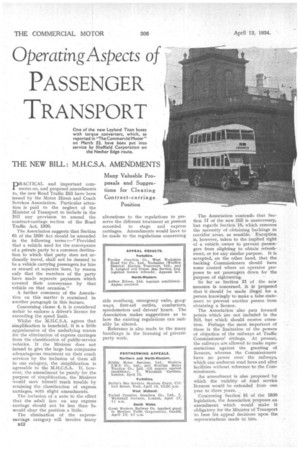Operating Aspects of
Page 52

If you've noticed an error in this article please click here to report it so we can fix it.
PASSENGER TRANSPORT
THE NEW BILL: M.H.C.S.A. AMENDMENTS
PR ACTICAL and important comments on, and proposed amendments to, the new Road Traffic Bill have been issued by the Motor Hirers and Coach Services Association. Particular attention is paid to the neglect of the Minister of Transport to include in the Bill any provision to amend the contract-carriage section of the Road Traffic Act, 1930.
The Association suggests that Section 61 of the 1930 Act should be amended in the following terms :—" Provided that a vehicle used for the conveyance of a private party to a common destination to which that party does not ordinarily travel, shall not be deemed to be a vehicle carrying passengers for hire or reward at separate fares, by reason only that the members of the party have made separate payments which covered their conveyance by that vehicle on that occasion."
A further comment of the Association on this matter is contained in another paragraph in this feature.
Concerning clause 4, it is considered unfair to endorse a driver's licence for exceeding the speed limit.
Whilst the M.H.C.S.A. agrees that simplification is beneficial, it is a little apprehensive of the underlying reason for the elimination of express carriages from the classification of public-service vehicles. If the Minister does not intend to give the large bus companies advantageous treatment on their coach services by the inclusion of them all in one category, the simplification is agreeable to the M.H.C.S.A. If, however, the amendment be purely for the purpose of simplification, the Minister would save himself much trouble by retaining the classification of express carriages, with slight amendments.
The inclusion of a note to the effect that the adult fare on any express
• carriage should not be less than Is. would clear the position a little.
The elimination of the expresscarriage category will involve many alterations to the regulations to preserve the different treatment at present accorded to stage and express carriages. Amendments would have to be made to the regulations concerning side overhang, emergency exits, gangways, first-aid outfits, conductors, speedometers and drivers' hours. The Association makes suggestions as to how the existing regulations can suitably be altered.
Reference is also made to the many handicaps in the licensing of privateparty work.
The Association contends that Section 17 of the new Bill is unnecessary, but regards Section 18, which removes the necessity of obtaining backings in corridor, areas, as sensible. Exception is, however, taken to the implied right of a vehicle owner to prevent passengers from alighting to obtain refreshment, or for any similar purpose. It is accepted,. on the other hand, that the backing Commissioners. should have some control where an operator proposes to set passengers down for the purpose of sightseeing.
So far as Section 21 of the new measure is concerned, it is proposed that it should be made illegal for a person knowingly to make a false statement to prevent another person from obtaining a licence.
The Association also puts forward points which are not included in the Bill, but which should receive attention. Perhaps the most important of these is the limitation of the powers of objection of the railways at Traffic Commissioners' sittings. At present, the railways are allowed to make representations against the granting of licences, whereas, the Commissioners have no power over the railways, which can undercut road fares and alter facilities without reference to the Commissioners.
An amendment is also proposed by which the validity of road service licences would he extended from one year to three years.
Concerning Section 81 of the 1939 legislation, the Association proposes an amendment which would make it obligatory for the Minister of Transport to base his appeal decisions upon the representations made to him. •


























































































